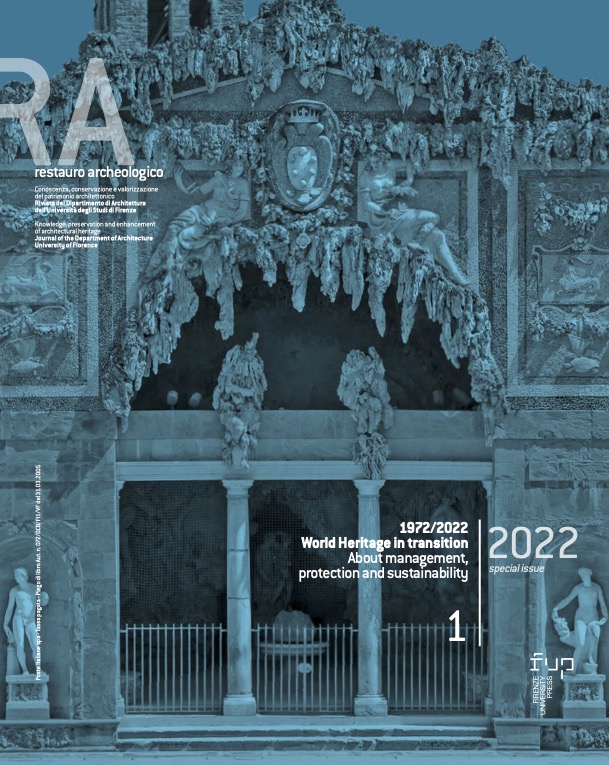Il sistema informativo territoriale della “Carta del rischio del patrimonio culturale italiano” e i siti UNESCO italiani: un processo virtuoso per il monitoraggio della vulnerabilità dei beni patrimonio mondiale
Published 2023-02-03
How to Cite
Abstract
The territorial information system was born following the Law of 19 April 1990, n. 84 (in Gazz. Uff., 26 April, n. 96), as an organic plan for the inventory, cataloging and elaboration of the Risk Charter for cultural heritage: first interventions. The system implements the pilot plan for the planned conservation of the cultural heritage of Umbria, a study promoted by Giovanni Urbani, then director of the Central Institute of Restoration. The Risk Map is a GIS composed of an alphanumeric database and the cartographic component, capable of exploring, superimposing and processing information relating to potential territorial and environmental risk factors linked to cultural heritage. The Risk Card system has two levels of risk. The first relates the concentration of assets and the danger of the territory, in order to evaluate, following a calamitous event, the probability of loss of the cultural heritage (Territorial risk). The second, on the other hand, evaluates the risk of loss of the individual cultural property and is implemented through the filing on the field of the vulnerability of cultural assets (evidenced by the state of conservation) and the relationship with the territorial danger around the property (Local risk). The CdR system produces and exposes the data present with WMS services (raster data), architectural and archaeological real estate (punctual, linear and polygonal), underwater archaeological files, historical centers and aggregated urban units of historical centers. It also has WFS services (vector data) of architectural and archaeological real estate (punctual, linear and polygonal), containers of movable goods (punctual), historical centers and aggregated urban units of historical centers. Since 2012, the Risk Charter has been in the interoperability of the Ministry of Culture within the territorial computerized system Constraints in the network, with which it increases the registry and georeferencing of cultural assets present for various reasons in the SigecWeb (ICCD) and Protected Assets systems (DG ABAP). Thanks to the agreement signed between the Service II - UNESCO Office of the General Secretariat and the Directorate General for Security of the Ministry of Culture, the system will be used for the assessment of the territorial risk of Italian UNESCO sites, but also, for the first time, to support the request for registration of a site on the World Heritage List. This is the candidacy of the “Via Appia. Regina Viarum "for which, with the support of ISPRA, the levels of territorial danger will be analyzed in detail, with reference to both natural disasters (earthquake, landslides, etc.) and to problems deriving from simple atmospheric agents and from pollution. In addition, the data on the state of conservation of the ancient route and the assets related to it will be collected with the appropriate cards of the Risk Card, which will allow the processing of vulnerability indicators and local risk indicators, which will be proposed to the UNESCO for monitoring the site over time.


